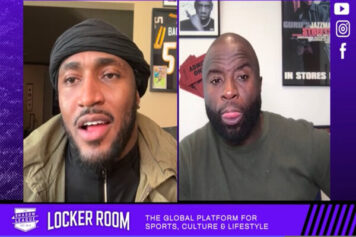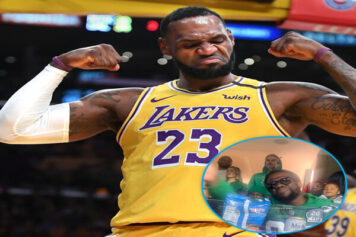Or perhaps I should say, dear brother athlete? You should know you are kindred to your community not simply from a genetic perspective but a socio-economic aspect as well. Do you recall when you were a child playing the game? You most certainly remember those days practicing your craft in cut off corduroy shorts and off-brand athletic apparel. Labels didn't matter, as the old you braved broken glass and rusty cans by playing tackle football in vacant lots and fields that were more dirt mixed with gravel and mud than grass. Your mother would admonish you for fingers and palms black on the wrong-hand side from perfecting a lethal handle by dribbling a half deflated basketball on uneven asphalt before dinnertime.
I'm sure you can also recall days shoveling snow off the basketball court in the winter time when the gyms were closed, or shooting on hoops made of milk crates or bike rims nailed to telephone poles. But it didn't really matter. Whatever geometric apparatus you could suspend in the air was good enough. You were like royalty, the shining black prince of the hood. And then you elevated.
It is not uncommon for young men who are athletically gifted to leave their respective hobbles and familial haunts to go off to institutes of higher learning, returning to the neighborhoods that spawned them as mentors, coaches, teachers, law enforcement, sports administrators and trainers. This is their penance paid. Others become political artisans, officers of the church, and even officers of the law.
No matter the opinion of any envious onlooker or contrarian, the initial catalyst for individuals who return to their communities after days playing is simply to give back. While there are some who stumble upon obstacles that clutter their noble endeavors, most had learned in their prior athletic aspirations to enrich the lives of those who come behind them and were inspired by their sporting and real world accomplishments. Many black athletes of merit are inundated by reminders to give back to the communities that spawned them from a very young age. Most carry those messages in their hearts throughout collegiate careers. The very best carry those positive hood hallmarks into their respective NFL and NBA endeavors. To the world, these occupations are merely jobs and the very best professional athletes are corporations unto themselves.
The high visibility that comes with being the best is parlayed into the promotional apparatuses of their leagues, and the marketing endeavors of corporate partnerships. For the greater American society, these people are just athletic entertainers. But for the hoods that spawned them they are much more. Aside from providing entertainment, those men and women who reach the very top are celebrated within the African American community. This is not done solely because of their physical mastery, but because of what they represent − especially to those who braved the same extreme poverty that birthed kings and queens. This sometimes inspires professional to give back financially to their community and to do so with impunity.
While no one can disparage those who altruistically give to numerous charitable institutions that are near to their conscience, money is not necessarily what is needed in most instances. There are those elite athletes who, by their outstanding athletic achievements and personal presentation skills, are given a platform upon which to address any issue of their choosing. But most refuse to do so. Why?
In the aftermath of the slaying of Trayvon Martin, the Miami Heat, led by Lebron James, were emboldened to show support toward the tragic cry for justice by donning hoodies in the Million Hoodie March campaign. Though I was pleasantly surprised and inspired by this show of support for a controversial issue, I was saddened by the realization that these inspiring instances are so rare an occurrence in the modern age where professional sportsmen receive up to 50 percent of their respective incomes from endorsements and corporate sponsorships.
Muhammad Ali, Jim Brown, Bill Russell and Kareem Abdul Jabar are but a handful of those who reached the pinnacle of their careers, but were brave enough to speak and act on the hot button issues of their day. For example, Ali suffered tremendous financial hardships for standing up against the war in Vietnam. Millions of dollars were lost in fight revenue as he sat in jail. But his voice was heard and moved many to speak out.
No one is expecting anything like Ali’s prison extremity to occur in the present. But there is room within this vacuum for top-level NBA and NFL players to eloquently give their support to the issues of gun violence, black-on-black genocide, poor public schools, gang violence, police brutality and other issues that have plagued the black community for decades. But it would seem that some leagues, the NFL in particular, have a system set up to immediately punish any attempts at free speech.
Last month, Chicago Bears WR Brandon Marshall was fined $10,500 for a uniform violation incurred when he donned green cleats in support of October’s Mental Health Awareness Week. Falling in the middle of Breast Cancer Awareness Month − a cause the NFL does champion −Marshall would have been fined whether or not he wore the cleats in October or for Christmas in December. Now, I do not believe the policy is purposefully designed to quell free speech. But it does so by proxy. It subconsciously reminds athletes that speaking against the common league logic is costly. Trickling down, this scared mindset is carried into their corporate dealings as well.
But there’s another side. Tiger Woods, Mike Vick and Kobe Bryant are the most prominent in a long line of black athletes who have lost millions in sponsorship due to off the field activities that were believed to shine a bad light on the corporations they sponsored. In each of their situations, the offense was of a moral nature. Athletes lose money every day for their willfully rebellious actions and off the field dealings as well. Are we fools to ask that they dare put their reputations on the line for the people? They do so for themselves in their oftentimes nefarious dealings, so why not for the kids? "I am not a role model,” said Basketball Hall of Famer Charles Barkley during a Nike ad in the 90s, “parents are role models." Since then, he has gone on record as admitting his younger self was wrong.
Like it or not, young men and women in African American communities, depressed places in particular, follow trends. We buy the sneakers our royal prince and princesses buy, we buy the cars they drive, drink the liquor we imagine they might sip and even emulate the way they walk. An athletic activist might not save the world, but could easily spark the mind that attempts to do so.
As a child learning of Muhammad Ali, and as an adult who witnessed the ongoing efforts of Jim Brown and Deacon Jones, I always imagined the day when there would be others. No, not everyone has the tools or attributes to speak on complex issues. But there are many who do, but remain silent. If not for fear of losing corporate sponsorships, then for fear of alienating others in the respective NFL and NBA fraternal orders. But, I say again, they are willing to cavort with hedonism for their own self indulgence despite the possibility of said behaviors threatening their bottom line. Why?
Dear Black Athlete: Are the beautiful struggles of those who come from similar backgrounds not worthy of championing?
I would argue that the same skills that allow for quick forgiveness when any professional athlete screws up (Ex: Riley Cooper's N-Word incident has been largely forgotten because of his play this season), will allow for swift forgetfulness when a hot-button issue near and dear to the black community is touched upon as well.
Imagine if one NBA or NFL superstar loudly and passionately championed the fight against gun violence or the gang culture that permeates the ghetto? The impact it would have on young minds would be immeasurable. Yes, the NBA has championed many causes through its "NBA Cares" philanthropic dealings. Athletes such as Dikembe Mutombo, Alonzo Mourning, Warrick Dunn and David Robinson each have charitable dealings that have defined their lives off the field. But many issues that are of the greatest concern to the black community are often overlooked and marginalized. This is why it is important for black superstar athletes to stand up and be heard.
Who’s going to marginalize Lebron James or Adrian Peterson? Being beyond reproach on the field would give them that much more freedom to speak out. But sadly, none do. Because of this mute stance on matters that are near and dear to the common black populous, most pros assign themselves to political impudence and foolish indifference toward the masses that cheer for them. But this is wasted power. We don't need the apathy or your money, dear black athlete. We need your words and your backbone.



